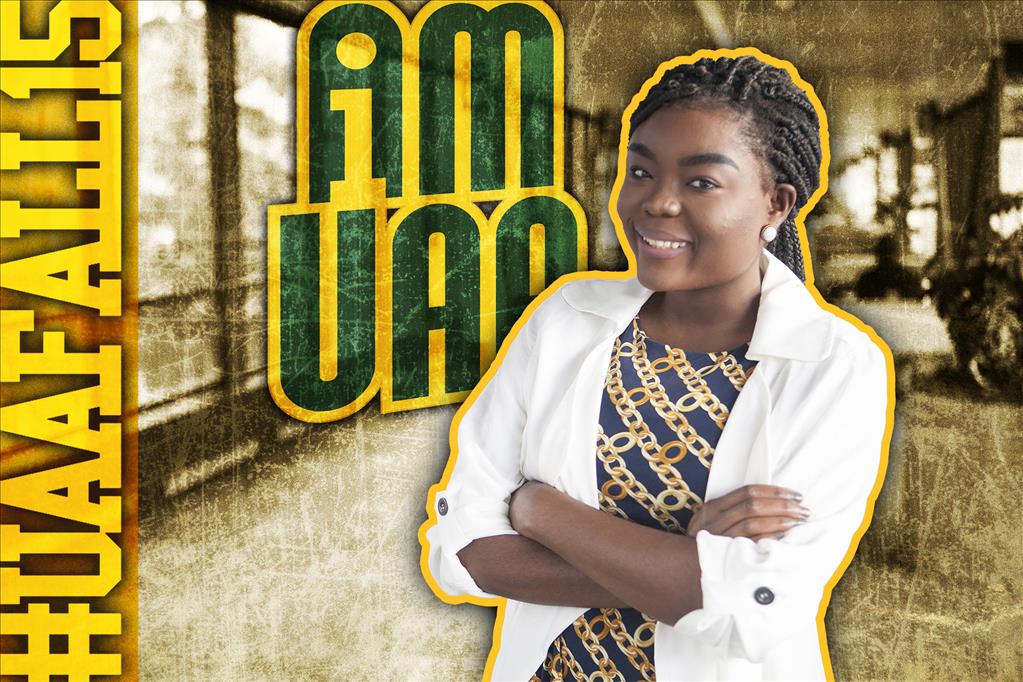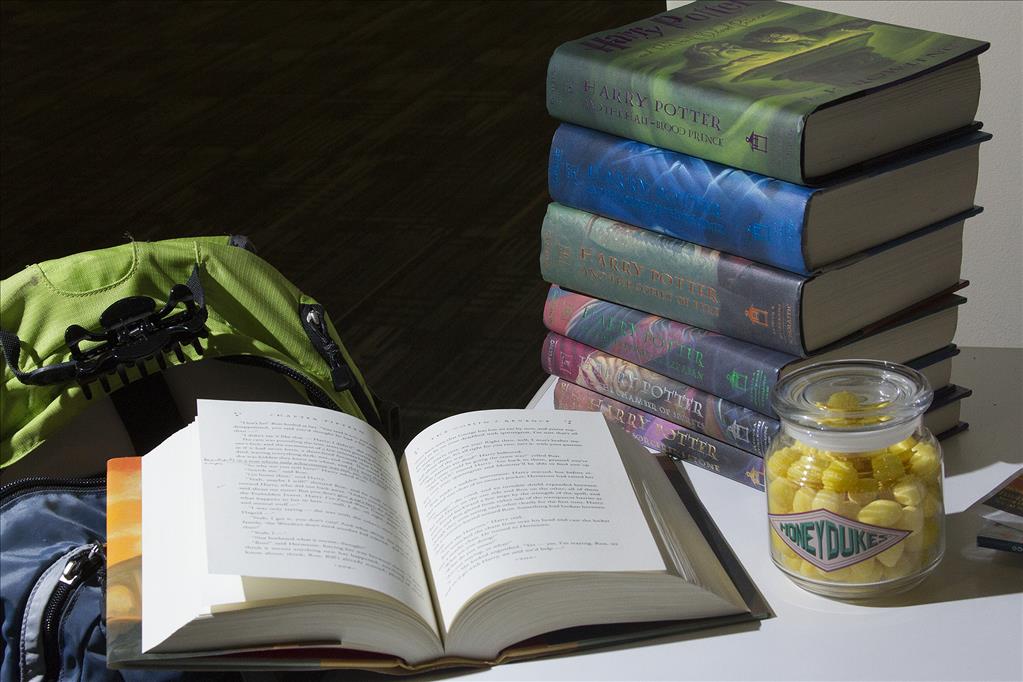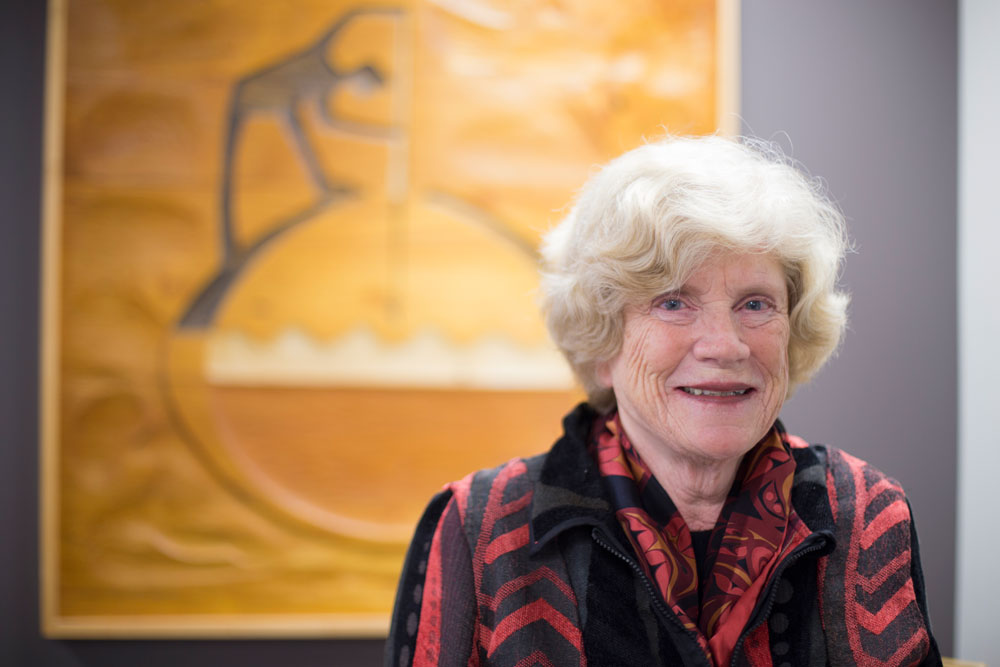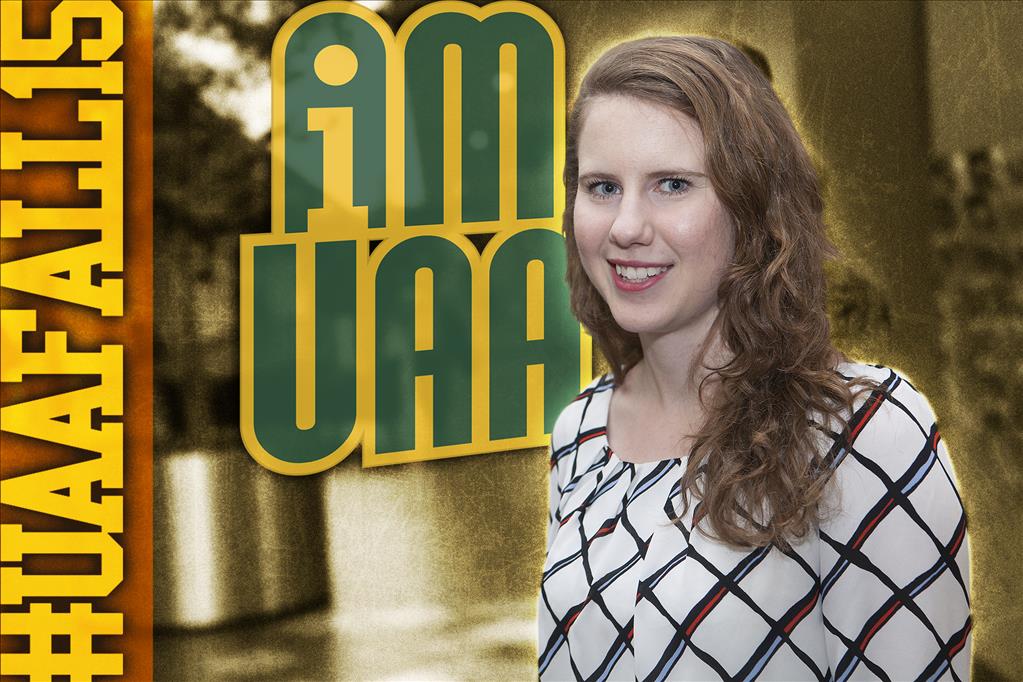Building a career of her own
by Tracy Kalytiak |
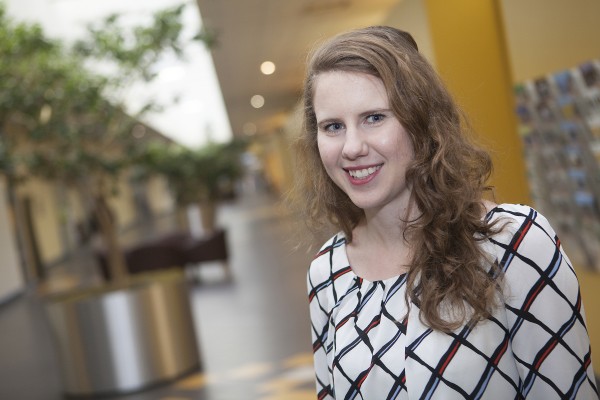
Emily Sobek is graduating at 2015 Fall Commencement with a UAA bachelor's degree in construction management and minors in economics and business. (Photo by Philip Hall / University of Alaska Anchorage)
Construction has long been a part of Emily Sobek's life. As a child, she would help scavenge wood from dumpsters and nail the pieces together to create forts. And, her father would often ask her to help him with an important task.
"My dad built houses when I was a kid so after the guys he hired left, he would give me an industrial magnet," the UAA construction management student said. "I had a string off it and would ride my little bike to go collect the nails at the job site so everyone was safe and his tires wouldn't be popped."
Now Emily Sobek is building a career of her own. She will graduate next week with a UAA bachelor's degree in construction management, with minors in economics and business.
How did she first learn about construction management (CM), a UAA program launched with seed money from Alaska's construction industry?
"My dad told me about it," she said. "I'm getting a degree that's going to be useful not only in Anchorage and Alaska but internationally."
Finding a relevant career
Originally from Fairbanks, Sobek's family moved to Anchorage in the 1990s. She attended Anchorage Christian Schools and decided to pursue a degree in nursing. Sobek enrolled in Liberty University in Virginia and took a year's worth of nursing classes there before deciding to return to Alaska and change the course of her education.
After talking with her father, she decided the UAA CM program would be a good fit with her academic skills and career goals.
"A construction management degree, it's very versatile," Sobek said. "You could be a scheduler, or materials procurement officer, or quality control manager, or a project engineer, you could even go into finance. Since it's essentially business specialization, I believe I could get a job outside construction and use my degree as a business degree. CM is not so much black and white; there's a lot of gray."
She noticed that people in Alaska's construction industry worked hard to form a construction management advisory board for UAA and stay involved in the UAA CM program: reviewing and updating the CM curriculum, sitting in on classes, speaking to faculty and students and offering internship and career opportunities to promising candidates.
"Everybody I know who graduates is absorbed into the industry," Sobek said. "It's great that the advisory board, and the Alaska community, comes to the university and gives suggestions that ensure students are learning skills and ideas that will be beneficial on graduation."
'They helped each other'
Sobek's first job in construction involved computer-aided drafting.
"I felt at a disadvantage due to the fact I didn't have field experience," she said. "But employers see the difference between being green and being lazy. They see that if you're willing to work, it doesn't matter that you're green. If you work hard, you can overcome that."
Sobek did work hard: She toiled as a drafter, account intern and quality control intern at three different companies.
"Coming into construction, being new, the guys like it when you go out and talk to them and if you ask them questions," she said. "They'd be trying to plumb a wall and make it straight and they'd show me how to use the laser to help make the walls straight. When someone was framing around an elevator, he'd get his little triangle out and I'd learn how he makes sure all of those four corners are 90 degrees. I ordered their materials for them, so I'd say, 'Hey, how do you do that? How do you get the concrete stairs you're pouring to be flush? If you teach me how to do it, I'll know the percent contingency to order extra.'"
Acknowledging a lack of experience on a job site isn't necessarily a bad thing, Sobek said.
"If you understand that and embrace it and try to learn, people are willing to help you learn, teach you," she said. "When you're young, you don't know much about any of the materials, so you're going to have to learn."
'That's 17 percent wrong'
In her classes, Sobek said, students with field experience helped those who didn't have it, and vice-versa.
"A gentleman in my class with zero experience was very proficient on Excel, and could understand documents, so he would help a carpenter in class understand documents and work Excel," Sobek said. "The gentlemen that had a lot of field experience would help figure out estimates-'It will take two hours to frame this wall.'-whereas the gentleman who knew Excel wouldn't know that. They'd have a really good result because they helped each other."
Being involved in the CM program has enhanced her networking and communication acumen.
"You know how there's a jargon for each field? In construction, there's pretty much two jargons-office jargon and field workers' jargon," Sobek said. "For example, when installing concrete, there is different terminology for the activity. If you're a project manager, they call that task 'placing' concrete but workers call it 'pouring' concrete. Things like that keep you on your toes!"
Sobek says she never knew the definition of the word "work" before she delved into construction.
"I think part of it is the responsibility and the time crunch," she said. "People are relying on you, your reputation. In school, you do your work and your work-quote unquote-is your homework. OK, so if you get an 83 percent on your homework, technically you're still passing. In the real world, you get an 83 percent on a takeoff and then you order the material and it's 83 percent correct, that's 17 percent wrong-you'll either have 17 percent extra material or be 17 percent short on material."
Enjoying the flow of money
Sobek uses her construction-related skills while volunteering for organizations like Habitat for Humanity. She's also volunteered for NAWIC, Salvation Army, Spenard Builders Supply and Anchorage Downtown Partnership.
"I have an economics minor, so I enjoy the flow of money a little bit, seeing where money is coming and going," Sobek said. "It's sometimes overwhelming. I didn't know I was going to have so much responsibility when I started-'Oh my goodness, that's a lot of zeros at the end of that number I just wrote!' But being in this program has made me more comfortable with my personal finances, and being in the real world by myself."
Written by Tracy Kalytiak, UAA Office of University Advancement
 "Building a career of her own" is licensed under a Creative Commons Attribution-NonCommercial 4.0 International License.
"Building a career of her own" is licensed under a Creative Commons Attribution-NonCommercial 4.0 International License.










